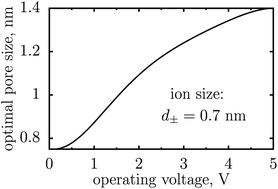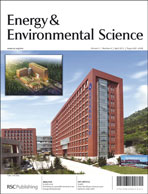Effect of pore size and its dispersity on the energy storage in nanoporous supercapacitors
Abstract
This paper focuses on the choice of the optimal pore size and the effect of pore size dispersion, which is important for the rational design of nanoporous supercapacitors. Optimization of the pore size of nanoporous carbon electrodes is discussed in terms of the maximal stored energy density. By applying a previously developed theory, and supporting it by newly performed experiments, we find that the energy density is a non-monotonic function of the pore size of monodisperse porous electrodes. The ‘optimal’ pore size that provides the maximal energy density increases with increasing operating voltage and saturates at high voltages. We also analyse how the pore size distribution affects the voltage dependent capacitance and the stored energy density, and show that the latter is maximized for monodisperse electrodes.


 Please wait while we load your content...
Please wait while we load your content...